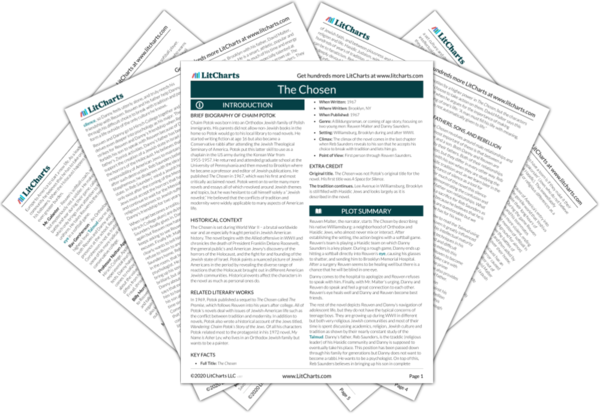The Chosen starts with a battle, or a near battle, in the form of a softball game between Reuven Malter’s school team and Danny Saunders’s infamously brutal Hasidic team. The Hasidic team plays with such brutality because they have been told that the only way that they will be allowed to have a team is if they make it their religious duty to beat the “apikorsim” (Jews who do not believe in god, or in this case are not Hasidic). This immediately introduces the idea of cultural or religious differences as a reason for battle or war.
They are also playing softball because of America’s entry into war. Jews felt the need to “show the gentile world that Yeshiva students were as physically fit, despite their long hours of study, as other American students.” During the game Reuven Malter’s coach, Mr. Galanter, calls him and his teammates “soldiers,” especially as the game becomes more violent, ending in Reuven’s injury. Although this is the last mention of softball in the book, war continues to serve as the background for almost the entire novel. Reuven and his father follow the battles of World War II, first on the radio in the hospital and then aided by maps cut out from the newspaper and hung all over their home.
After the actual battles end, the news of the Holocaust has an even greater impact on their lives. The pain and horror caused by the atrocities of the Holocaust brings David Malter out of his isolated community and into the wider world. David Malter becomes an important leader in the Zionist movement (a push for a Jewish state in Palestine) and the first mention of Manhattan (or any area that the family has been to outside Brooklyn) comes when he attends a Zionist movement at Madison Square Garden. His son does not go, further highlighting that this is a great distance for the Malters. WWII and its aftermath brought this small Brooklyn community into global affairs.
The discussion of a Jewish homeland also creates conflict in Williamsburg, highlighting the differences between the different sects that live so close together. The Hasidic Jews are violently against Zionism because they fear the possibility of a secular Jewish state, other Jews in the community believe that it is important to take action now that 6 million of their people have been killed, and that Jews need a country that they can make safe for their people, whether or not they are deeply devout.
Through the fights and arguments that break out on the streets and in school, The Chosen demonstrates different perspectives on how to deal with suffering. The Hasidic view is to take on the suffering of others and deal with it through silence, prayer and study of God, all while continuing to wait for the coming of the Messiah. Other Orthodox Jews, like David Malter, believe that action must be taken to save the Jewish community--in this case a Jewish state. He believes that they can wait no longer and so in spite of his orthodox views he works to bring even non-practicing Jews over to his cause. WWII endangers the future of Judaism and The Chosen depicts how different Jewish Americans separate from yet affected by Holocaust can to react.
World War II and War ThemeTracker

World War II and War Quotes in The Chosen
I felt myself suddenly very angry, and it was at that point that for me the game stopped being merely a game and became a war.
“We are like other people, Reuven. We do not survive disaster merely by appealing to invisible powers. We are as easily degraded as any other people.”
“I feel like a cowboy surrounded by Indians.”
I didn’t agree at all with his notions of the world as being contaminated. Albert Einstein is part of the world, I told myself. President Roosevelt is part of the world. The millions of soldiers fighting Hitler are part of the world.
A spider had spun a web across the corner of the upper rail, and there was a housefly trapped in it now, its wings spread-eagled, glued to the strands of the web, its legs flaying the air frantically.
It was as senseless, as – I held my breath, feeling myself shiver with fear – as Billy’s blindness was senseless. That was it. It was as senseless, as empty of meaning, as Billy’s blindness. I lay there and thought of Roosevelt being dead and Billy being blind, and finally I turned over and lay with my face on the pillow and felt myself crying. I cried a long time.
“The world kills us,” he said quietly.” Ah, how the world kills us.” … “The world drinks our blood,” Reb Saunders said. “How the world makes us suffer. It is the will of God. We must accept the will of God.”
“I am not satisfied with it either, Reuven. We cannot wait for God. If there is an answer, we must make it ourselves.”
“It is beginning to happen everywhere in America. A religious renaissance some call it.”
The death of six million Jews had finally been given meaning, he kept saying over and over again. It had happened. After two thousand years, it had finally happened. We were a people again, with our own land. We were a blessed generation. We had been give the opportunity to see the creation of the Jewish state.











